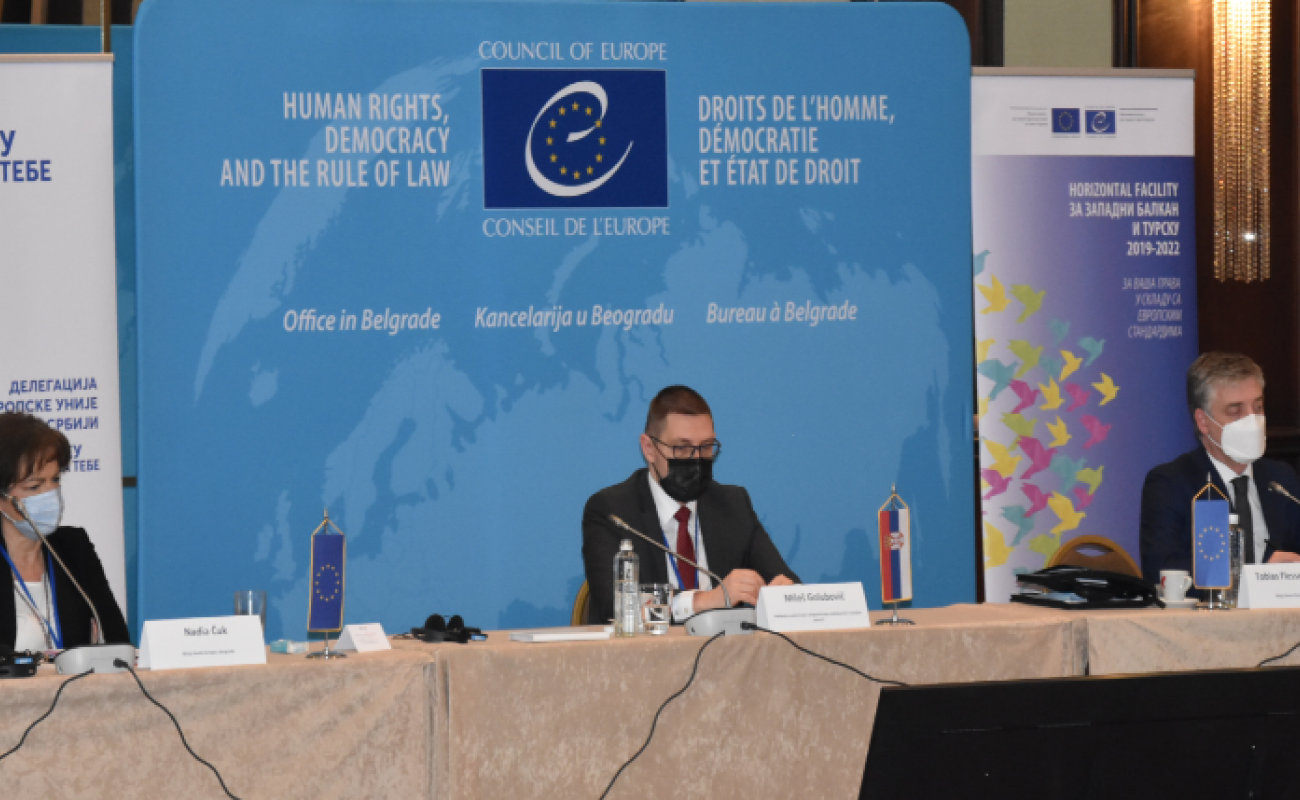EU-Council of Europe programme in Serbia: tangible results achieved over three years will pave the way for further co-operation

Judges and prosecutors in Serbia now have mechanisms for reporting undue influence; for more than 20,000 students, gender-awareness will become an integral part of the curriculum; gender-related dangers faced by women involved in journalism are a part of the training for legal professionals and police officers, aimed at strengthening safety of journalists; eight local self-government units allocated adequate budgetary funds for the measures to improve the situation of LGBTI persons.
These are just some examples of the tangible results achieved in the second phase of the European Union and Council of Europe joint programme "Horizontal Facility for the Western Balkans and Turkey 2019 - 2022" designed to help beneficiaries in the region comply with the European standards. These results were presented today in the third Beneficiary Steering Committee meeting of the programme.
Tobias Flessenkemper, Head of the Council of Europe Office in Belgrade noted that since 2016, when the first phase of the programme was launched, up to now it has contributed to many reforms in Serbia.
“We have observed many changes over the past five years. Citizens in Serbia have become more aware of their rights and of the potential of the European standards for Serbia’s future. The coming years will be decisive for consolidating positive change for fundamental rights and freedoms for everyone in Serbia”, he said.
Miloš Golubović, Head of the Department for Planning and Programming of EU Funds and Development Assistance of the Ministry of European Integration of Serbia highlighted that the Republic of Serbia remains committed to the reform process on its European path.
“Continuation of successful and sustainable reforms in the field of rule of law, respect for human rights and democratic governance are important not only to advance on the European integration path, but also to ensure substantial structural changes in the society. Financial and expert support provided by the European Union and the Council of Europe are an important contribution to the efforts of the Republic of Serbia in this regard. Significant results have been achieved in the current phase of the Horizontal Facility programme”, concluded Golubović.
Nicola Bertolini, Head of Co-operation, Delegation of the European Union to Serbia, said: “The European Union continuously support Serbia's reform process through important actions with partners such as the Council of Europe. The shared values are key for the success. The progress is noticeable but there is still much work to be done. The European Union will continue to firmly and undoubtedly support Serbia in achieving the genuine reforms in the rule of law, fundamental rights and democracy, on the path to its membership in the Union”.
According to Delphine Freymann, Head of Programming Department a.i. , Office of the Directorate General of Programmes of the Council of Europe, now is the time to start taking stock of the results achieved and prepare together the way forward.
“The European Union and the Council of Europe have continued to accompany Serbia throughout its reform process, as illustrated by the increasing support provided by the programme and its Expertise Co-ordination Mechanism to the legislative and constitutional revisions undertaken in various areas”, Delphine Freymann stated.
Justice-related Horizontal Facility actions have certainly been the backbone of the legal reform in Serbia, that resulted in establishing the system of the confidential counceling on ethical issues for judges and prosecutors, and contributed to further alignement of domestic courts’ practices with European human rights standards. The involvement of the Venice Commission, under the Expertise Co-ordination Mechanism, in assessing the compliance of the constitutional provisions on the judiciary with European standards was instrumental for the reform process in this area.
When it comes to the enhancement of the human rights protection for detained and sentenced persons, the new Prison Strategy and its Action Plan for 2021-2027 were finalised. Consequently, each prison in Serbia now has at least one trainer able to roll out five specialised standardised Offender Behaviour Programmes for treatment staff in prisons throughout the prison system.
The programme has also focused on promotion of diversity and equality. Under this component, preparation of expert opinions on the amendments to the Anti-Discrimination Law, on the new Gender Equality Law and on the draft Law on Same-sex Unions were supported.
In the field of ensuring quality education for all, in co-operation with the Institute for Education Improvement, the content of more than ten curricular subjects are now connected with the Council of Europe’s Reference Framework of Competences for Democratic Culture competences and descriptors. The total of 60 pilot schools have included gender-awareness and equality into their action plans; it will thus become an integral part of curricular and extra-curricular activities for more than 20,000 students and teachers.
Important work was carried out under the programme in preventing and combating trafficking in human beings by supporting judges, prosecutors, police officers, law students, labour inspectors, education professionals and civil society organisations not only in advancing their knowledge on anti-trafficking issues, but also in identifying the immediate priority actions and encouraging joint responses. Moreover, a digital information platform was created to inform young people about risks of trafficking in human beings, ways to report them, and assistance available to victims.
Under the programme component focusing on freedom of expression and freedom of the media, dialogue between the Protector of citizens office and the journalists’ associations in Serbia was fostered on how to improve safety of journalists. Training sessions on this topic, notably, emphasized the gender-related dangers faced by women involved in journalism.
The meeting participants reiterated the readiness of the European Union and the Council of Europe to continue to support Serbia on its path towards alignment with European standards in implementing its EU accession reform agenda.
